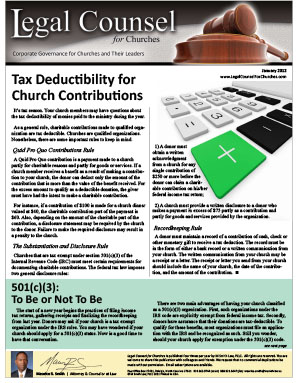The start of a new year begins the practices of filing income tax returns, gathering receipts and finalizing the recordkeeping from last year. Donors may ask if your church is a tax exempt organization under the IRS rules. You may have wondered if your church should apply for a 501(c)(3) status. Now is a good time to have that conversation.
There are two main advantages of having your church classified as a 501(c)(3) organization. First, such organizations under the IRS code are explicitly exempt from federal income tax. Secondly, donors have assurance that their donations are tax-deductible. To qualify for these benefits, most organizations must file an applica- tion with the IRS and be recognized as such. Still you wonder, should your church apply for exemption under the 501(c)(3) code.
The Internal Revenue Service does not require churches to file an application for exemption in order to be tax exempt and receive tax deductible contributions. However, many churches voluntarily file applications for exemption. Many believe that this recognition by the IRS reassures church leaders, members and donors that the church is tax exempt. If your church plans to seek institutional funding from sources like foundations, the IRS designation could be a necessity.
Individual and corporate donors are more likely to support organizations with 501(c) (3) status because their donations are as- sured of being eligible for a tax deduction. Recognition of exemption under section 501(c)(3) often convinces foundations and other grant-making institutions that they are issuing grants or sponsorships to legitimate recipients.
An IRS determination of 501(c)(3) status is recognized and ac- cepted for other purposes. For example: state officials may grant exemption from state income, sales and property taxes; and the U.S. Postal Service offers reduced postal rates to certain organizations. In other words, the 501(c)(3) status reduces the burden of proving an organization’s nonprofit credentials.
If you are considering applying for nonprofit status under the IRS code, you should be aware of three key requirements. First, a nonprofit organization must be organized as a corporation, trust or unincorporated association. Secondly, a substantial portion of your church’s operations must further its exempt purpose. Finally, exempt purposes must be taken from a predetermined list. Religion is included on the list.
Public Inspection Rule
If your church decides to operate under the 501(c)(3) IRS exemptions, you should be aware of the Public Inspection Rule. Your church must make your application for tax exempt status and any annual returns available to the public for inspection, upon request and for no more than a reasonable charge for copying. Each annual return must be made available for a three-year period starting with the filing date of the return. The IRS also makes these documents available for public inspection and copying. These documents must be made available at the church’s principal office during regular business hours.
Upon request, an organization must furnish copies of the application and the three most recent annual returns. The requests may be made in person or in writing. For tax years beginning
after August 17, 2006, section 501(c)(3) organizations that file unre- lated business income tax returns must make them available for public inspection, and the IRS must make those returns publicly available.
If your church decides to apply for exemption under the IRS 501(c) (3) code, you should consider the applicability to your situation. Ultimately, you should make a business case for the benefits and disadvantages of formalizing your church’s nonprofit status.

